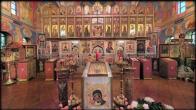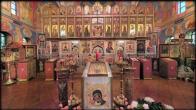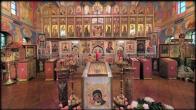You are here
Notes on the Liturgy and the Church.
S.I.Fudel
Chapter 11
"Let us, who mystically represent the Cherubim, and chant the thrice-holy hymn unto the life-creating Trinity," now lay aside all earthly cares, that we might lift up the King of all, who comes invisibly upborne on the spears of the ranks of Angels. Alleluia, Alleluia, Alleluia.
In the church, the "Liturgy of the Faithful" begins with those words. In fact, it is only up to those words that we can speak or write about the Liturgy. From that point on is something beyond our understanding, something by the Saints lived and continue to live. "It was said… about Abba Marcellus of the Thebaid… that… when [he] stood during the service, his chest was drenched in tears. For he would say that while the service was going on, 'I would see the entire church as if ablaze, and upon the conclusion of the service, the flame would again die down.'" However, on the other hand, how can one not write [about it]? Is it not specifically beginning with the Cherubic Hymn that the will of God becomes something quite different: that we - all of us - might participate in His holy [action], that we might attain unto holiness - 'we who mystically represent the Cherubim'? Priest Paul Florensky asks, "Does not like depict like?" This means that within each of us there is something like unto the Cherubim... It is that which is of such great importance, it is the Cherubic kernel of our soul... God instilled in man His greatest gift - the image of God." Holiness is something ineffable, but we sense that it is one's stepping out of the mental and physical darkness of man into the light-bearing image of God, that Cherubic kernel of Him. That step takes place through grace, when God sees the labor of love and repentance, when He sees that someone understands that he is in no way worthy of God's grace, but nonetheless seeks it. The entire Word of God and all of the teachings of the Church are filled with calls to holiness and revelations of holiness, while we over the course of centuries have gotten used to the idea that 'saints" exist only in icons, that in our lives such things do not exist, and that all of the calls to holiness are only allegorical ones. And in fact, for those who prefer that it not be real, holiness began to fade out of life and into allegory, and the land of the Church began to experience a drought, and to yearn after the rain of grace. "When the Son of Man cometh, will He find faith on the earth?" (Luke 18: 8)
Holiness is not immaculate perfection. Not one saint would consider himself to be immaculate. When the Apostle says, "Christ came to save sinners, of whom I am chief, he was speaking the absolute truth. St. John Chrysostom writes, "What madness? A man, you call yourself clean… and are convinced that you are clean… Thousands of passions surround your soul… and you dare say that you are clean of such a multitude of disturbances?.. Tell me, can anyone affirm that he remains clean over the course of one single day?.. Can he boast that he did not fall into vanity... that he has not been reckless, that he has not looked out through unrestrained eyes?"
For the saints, holiness is not perfection, and especially, is not seeing oneself as perfect, but rather a constant striving toward it, or more accurately, toward God, in repentance and love. "I count not myself to have apprehended," says the Apostle (Philippians 3: 13). - " but I follow after, if that I may apprehend that for which also I am apprehended of Christ Jesus." (Philippians 3: 12). In striving toward God, man abides in grace. Thus, one can say that holiness is the state of grace, the actual state of grace, rather than a grant of license or something "assuming the responsibility to act on behalf of" something. It is a crown - one sometimes received and perhaps sometimes lost and again found over the course of one's life. St. Tikhon of Zadonsk writes that "A sinner remains a sinner until he stops sinning and stops living without fear (of sin - S.F.); when he tears himself away from his sins and repents of them, he is already united to God's grace and the ranks of the righteous."
There are two reasons for holiness becoming more scarce. The first is an unwillingness to work at cleansing the soul, and here no explanation can be of help; only the ray of God's Light is capable of lighting the narrow path. The second cause is our ignorance: we think that the state of grace is a reward for moral labors, for good works, something we achieve by some kind of religio-juridical right, and many of us prefer not to believe in a holiness other than that attainable through such a commercial transaction. We do not know the teachings of the Church. One is saved by God's mercy alone, by grace, i.e. by a gift, and not by performing some spiritual feat. However, that spiritual feat (or "good works") is an essential factor in demonstrating our will to God, in demonstrating our love for Him, showing Him the only thing He wants from us. Just as in the case of holiness, there is something unfathomable in this union of the gift of salvation and spiritual struggle; their inseparability is one of the Mysteries of Christianity. In his Epistle to Titus, Chapter 3, verse 5, the Apostle writes: "Not by works of righteousness which we have done, but according to His mercy He saved us… . In verse 8 of the same chapter, we read: "...that they which have believed in God might be careful to maintain good works. These things are good and profitable unto men." Everything within us that is good comes from grace, and all good works are performed through it and thanks to it. However, man must also want to obey the Commandments and undertake to do so with all his will, i.e. he must apply to it his total effort and dedication; in his turn, the Lord, seeing this act of will, man's will striving towards Him, will immediately send grace to accomplish the work. Our attempt, our striving or effort to accomplish the work is a podvig, a spiritual struggle. Thus, our podvig is our effort to lift a weight utterly beyond our capacity to lift. The lifting is done by grace, by God's help. Without grace, nothing is accomplished, but the Lord does not grant it unless he sees our efforts, or the podvig of our love, our will, for "love (is - S.F.) the virtue of the will" (Nicolas Cabasilas). St. Symeon the New Theologian writes, "...As to all the good works any Christian should do, he must confess that they are done by Christ, and not by himself; it is in vain that anyone who does not contemplate on that is a Christian... All who repose in holiness and virtues are saved by a free gift and not … in reward for their virtues.... However, for a Physician to come, one must invite Him to come...."
This is why in one ancient Liturgy (the Syriac Liturgy of the Holy Apostle St. James) the interweaving of holiness and humility, something so difficult for us to comprehend and yet so natural for that time, is so clearly expressed: "Let us attend in fear and trembling, humility and sanctity. Lo the sacrificial gift is offered, and Glory is revealed. The Heavens open up, and the Holy Spirit comes down upon these Holy Mysteries, and they are permeated with It. We stand on this awesome spot together with the Cherubim and the Seraphim. We have become brethren and concelebrants with the Angels, and together with them we perform the service of fire and the Spirit." That direct simplicity of the ancient attitude toward holiness is the result of the sincere awareness that it is found not as the result of virtues, but as a gift, by God's mercy.
"The Holy Gifts are called Divine Gifts… (they - S. F.) are offered to us by the Lord absolutely freely; we on our part do not at all deserve them." (Archpriest John of Kronstadt).
Ven. St. Mark the Ascetic writes: "The Lord, wanting to show that despite the fact that all Commandments were mandatory, mankind was granted adoption as a gift, by His Blood, He said: "...when ye shall have done all those things which are commended you, say 'we are unprofitable servants: we have done that which was our duty to do.'"(Luke 17: 10. - S. F.). Thus, the Kingdom of Heaven is not a recompense (payment - S. F.) for works, but the Lord's grace, prepared for His faithful servants." Seeing God's Blood, man understands that it is only through It that he is saved, only because of It does he receive grace. In the Liturgy used in the early centuries, there was a prayer before Communion which spoke of the simplicity of apprehending sanctity: "Remember, O Lord, Thy Church, to preserve It from all evil and to make It perfect in Thy love. And from the four winds, gather it up sanctified, into Thy Kingdom, which Thou hast prepared for It. For Thine is the power and the glory forever! May Thy grace come, and this world pass away! Hosanna to the God of David! If any should be holy, let him approach. If any not be, let him repent. Maranatha (Yea, Lord, come! - S.F..) Amen."
"If anyone not be holy, let him repent." - There is that most-holy direct simplicity of early Christianity that we have lost. Holiness is just what our standing before God should be. In our cold times we do not desire holiness. We fear it, and fail to understand it, although it is but striving toward love for God, and it is in the resolution of the question of holiness for each of us and for the whole Church that our future and the future of the Church lies. The fate and future of Christianity is not decided at international conferences, but in the spiritual struggle of repentance by each and all, in their Golgotha and their Resurrection, in their holiness. And once, again, that is revealed most of all in the Liturgy.
PARISH LIFE
RECENT VIDEOS
Address of our Cathedral
Subscribe to our mailing list
While all the materials on this site are copyrighted, you may use them freely as long as you treat them
with respect and provide attribution on the Russian Orthodox Cathedral of St.John the Baptist of Washington DC.









